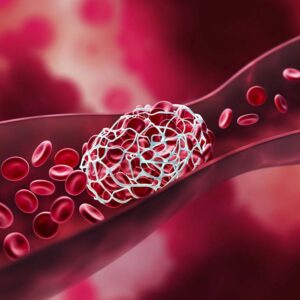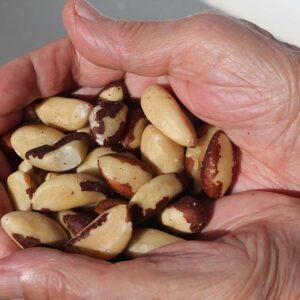
How to Ward off Cancer in Just 60 Seconds a Day
Dear Living Well Daily Reader,
Imagine you’re about to be dropped off on a deserted island for a year and you can only bring the seeds for one vegetable.
Which would you choose?
Well, if you’re looking to significantly increase your body’s ability to fight cancer cells, there’s a clear winner: broccoli seeds.
The consumption of broccoli and other cruciferous vegetables has long been linked to reduced rates of cancer in epidemiological studies, and recent research is showing that one of the compounds in broccoli may hold the key to optimizing the body’s ability to ward of cancer.
And in just a minute, I’ll show you how you can get up to 30 times the cancer-busting benefits of broccoli without eating a single floret (and no, it’s not by taking a supplement).
Broccoli contains a compound called glucoraphanin, which is a precursor to a compound called sulforaphane.
Sulforaphane has strong anti-cancer properties and works against cancer in two ways.
First, it helps block the initiation of cancer by inhibiting the metabolism of procarcinogenic substances into carcinogens. That means it helps stop those could-be cancerous substances from becoming cancerous. Sulforaphane also helps the body detoxify carcinogenic substances and excrete them from the body.
And second, if cancer has already begun to grow in the body, sulforaphane can help shut it down by modulating cell growth and cell death.
Sulforaphane has been shown in in vitro studies to have anti-cancer effects against prostate, breast, colon, and urinary cancer cells. Most importantly, it has been shown to inhibit cancer stem cells.
The stem cells are the parent cells of cancer, and if they are not destroyed, the chances of the cancer returning are high. Most conventional cancer treatments, including radiation and some forms of chemotherapy, do not affect cancer stems cells.
Compounds that can inhibit or kill cancer stem cells are the best defense in the fight against cancer.
And that’s good news. But when researchers tried to calculate the amount of broccoli one would have to eat to have a significant amount of protection against cancer, they found that it would take about two pounds per week.
And that’s raw broccoli, since cooking can destroy the enzymes that are necessary for sulforaphane to be absorbed in the body.
The thought of that much raw broccoli makes my stomach groan. Not because I don’t like broccoli, but because it’s quite hard to digest in its raw state.
(Fun fact: Tom “Broccoli” Landers holds the world record for eating a pound of raw broccoli in just 92 seconds. I’d want to be far, far away from Mr. Landers about an hour or two after that competition.)
But there’s a much easier way to get all the cancer-busting benefit of broccoli without having to stuff yourself with it every day: broccoli sprouts!
Broccoli sprouts may actually be even more powerful for fighting cancer than mature broccoli, as they are extremely rich in glucoraphanin. In fact, just 5 grams of broccoli sprouts contain the same amount of glucoraphanin as 150 grams of mature broccoli.
With broccoli spouts, just a few tablespoons a couple of times a week is enough to offer significant protection.
Broccoli sprouts have also been shown to help protect against gastritis (stomach inflammation) caused by H. pylori infection, and may also help protect the skin against UV radiation.
Though you can find sprouts in the grocery store, they are very easy to grow. I’ve been growing sprouts every couple of weeks for the past year, and all it takes is about 60 seconds a day.
First, you’ll need a bowl, a mason jar, some sprouting seeds, and a sprouting lid that fits the mason jar. You can also use a reusable coffee filter instead of a sprouting lid.
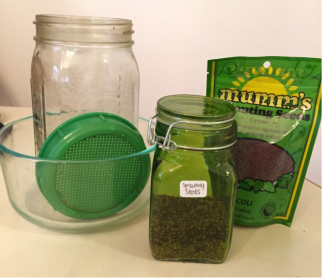
The seeds in the jar are for a mixture of broccoli, alfalfa, and other plants. The package is all broccoli seeds.
First, put about a tablespoon of the seeds into the jar and cover them with water. Let them sit in the water for about eight hours.
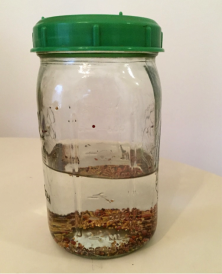
Then, drain the water and rinse the sprouts. Prop the mason jar in the bowl like so:
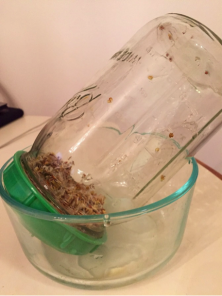
These are the sprouts after about two days. You’ll notice the little white roots starting to emerge
Twice a day, rinse the sprouts by filling the jar through the sprouting lid and draining the water. Then prop it in the bowl again. Keep the sprout jar on your counter, but not in direct sunlight.
After about five-seven days, you’ll have a decent amount of sprouts:
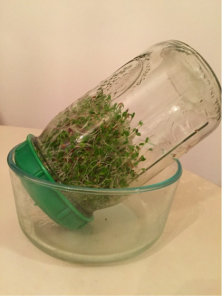
On the day before you want to use them, put them in a sunny window to help them get greener.
To store them, I like to take the sprouts out of the jar, leaving them attached to the lid, and let them sit on the counter for a couple hours to dry out just a bit. Then I carefully remove them from the lid and put them in a storage container that’s been lined with a paper towel.
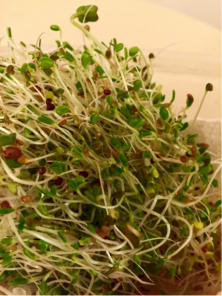
And voila! You just grew you own cancer-fighting superfood.
You can use the sprouts in your morning omelet, on your salad, or even just by themselves as a side with your dinner. They taste pretty neutral, not nearly as strong as mature broccoli.
To living well,

Jasmine LeMaster
Health Researcher
View More Free Articles
Mailbag: Diarrhea Remedies That Really Work
“I have had diarrhea for 6 months. I’m going crazy and don’t know how to stop it! Please help!” – Can’t Stop Running Dear Can’t Stop, Few things disrupt life like battling a bout of diarrhea. Diarrhea is typically defined as having three or more loose, watery stools daily. If you experience this for over...
Take the SHORTER Path to Dramatically Better Health
Are you tired of fitness gurus preaching the virtues of 5 AM workouts and pushing Olympic-level training regimens? Their narrative can feel exhausting and entirely unattainable. But before you toss in the towel completely, I’ve got news that might just put a spring back into your step. A groundbreaking new study reveals that the key...
Unexpected Perks of Your Coffee Habit Revealed!
We all know that the first cup of coffee in the morning can FEEL like a lifesaver. But what if it might actually BE saving your life? A groundbreaking new study suggests that your daily coffee habit could be protecting you from not just one but multiple chronic diseases. Let’s pour over this fascinating research…...
The TRUTH About Diabetes Drugs and Brain Aging
You’ve probably seen the gushing headlines… Most say something like, “Common diabetes drug protects the brain against aging!” And let’s face it, that sounds fantastic. After all, who doesn’t want to keep their brain young and in tip-top shape? The headlines refer to the results of a new study that suggests the widely prescribed type...
Hidden Smartphone Danger Puts You at Risk
Remember when we thought cell phones were just something for young folks to obsess over? Back when we were convinced they were nothing more than a passing fad? Well, times certainly have changed. Now, most people… including many of us older folks… have jumped on the smartphone bandwagon. Heck, some of us are practically as...
Preserve Your Mobility with “Agile Aging” Exercises
Aging has a way of humbling us. You lose hair where you want to keep it—and often end up growing it where you don’t. With every passing year, your eyesight fades, and your waistline expands. And as your once quick pace begins to slow, you fear developing the dreaded “senior shuffle.” But here’s the thing....
Yes, Lazy Saturday Lie-Ins Can BOOST Your Health
Are you burning the midnight oil during the week and catching up on sleep on weekends? Well, I’ve got some news that might help you feel less guilty about those lazy Saturday mornings. A new study suggests that weekend lie-ins might be doing far more than just helping you feel refreshed. Experts say they could...
Mailbag: 7 Hidden Culprits Behind Your Weight Gain
“Why am I gaining weight, even though I am watching what I am eating?” – Battling the Bulge Dear Battling, Gaining weight when you’re not trying to is frustrating. And it just gets worse as we age… often regardless of our diet. The truth is that various factors can promote weight gain even when you’re...
Popular Artificial Sweetener Linked to Dangerous Heart Risk
Remember when erythritol was the darling of the health food world? Well, this popular sugar substitute might not be as sweet a deal as we were led to believe… A shocking new study reveals a dark side to this widely used artificial sweetener. It turns out erythritol is associated with a dangerous—and even deadly—heart risk....
Cracking the Code on Chronic Inflammation
Inflammation and obesity are the evil tag team at the heart of nearly every major disease we face—from diabetes to obesity. What starts as a normal, healthy process to fend off dangerous invaders can quickly fan into the flames of chronic inflammation… and that includes in your gut. The trouble is almost no one has...








